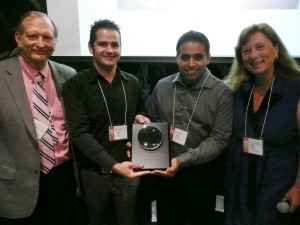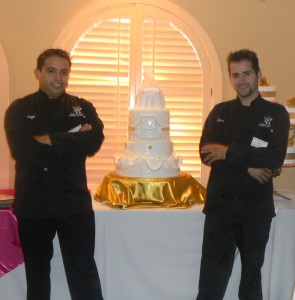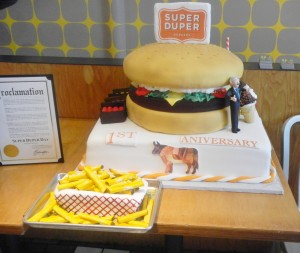Updated April 2019
Winners, 2013 Faces of Entrepreneurship Award
 In the mid-2000s, Jorge Flores worked for a company that imported stuffed animals and promotional materials from China and distributed them across the country. When the job moved from San Francisco’s East Bay area to Stockton, the 1.5-hour commute was too much. Then the owner downsized.
In the mid-2000s, Jorge Flores worked for a company that imported stuffed animals and promotional materials from China and distributed them across the country. When the job moved from San Francisco’s East Bay area to Stockton, the 1.5-hour commute was too much. Then the owner downsized.
Meanwhile, his brother Oscar had been working for a bakery owned by his godfather. Over eight years, Oscar came to run the bakery and loved what he was doing. When his godfather passed away, the family took over but didn’t have experience running a bakery. The problems started.
Tired of driving, in 2005 Jorge sold his house and approached his brother Oscar about opening their own place. They bought a donut shop and Don Polvoron Bakery was born. Jorge would run the sales side and Oscar would be in charge of baking. The shop was in a mostly Latino area so instead of donuts, they catered to the local population. Instead of closing at 2:00 pm, they expanded their hours to open at 5:00 am and to close at 9:00 pm. They attracted a loyal clientele in the morning – the gardeners, construction workers, and other early risers. They wanted breakfast. Then Jorge asked them “what else do you need,” and the answer was “something to eat over there.” So Jorge added sandwiches.
The bakery became popular. In the afternoons, the families came. Jorge listened to customers who wanted him to sell other drinks besides coffee. The bakery started to sell homemade hot chocolate and champurrado, a traditional Mexican hot drink made of corn flour, milk, vanilla, and cinnamon.
The first two years were really hard – waking at 3:00 a.m., arriving home late, and not making much profit. The worst was when a piece of equipment broke and there were no funds to fix it. Jorge found the money somehow, even though the bank wasn’t an option because of credit issues. But the brothers worked hard. Jorge told his wife, “there will be good times and bad times.”

Jorge still wanted to do better, so he began taking cake-making classes. He learned to work with fondant, experimenting, researching ways to improve his craft. Jorge started getting requests for cakes he never had baked. He never says “no, I can’t.” If he doesn’t know how he figures it out and finds out how to do it right.
For example, he learned how to make a green dress cake. A woman came in and wanted a standing cake of her daughter’s quinceañera dress. So Jorge figured that if he put a structure in the middle then that would help keep the shape, even if decorating was harder. He took the finished cake, worried it would fall because of its weight, to the event hall in one piece. The woman put the masterpiece in the middle of the dance floor so everyone could see all the details. A week later, a framed photo arrived with a note that said: “you’re part of the dress.”
“It’s the special things that you can do for people that set our business apart,” says Jorge.
There are many examples of Jorge living by this principle. One Thursday, a woman came in crying because the people who were supposed to make her daughter’s quinceañera cake wouldn’t do it. The party was on Saturday with 300 guests. Jorge decided that even if he had to work all night, he couldn’t leave the girl without a cake. Now, that woman won’t go anywhere else for her bakery needs. Another Friday, Jorge was with his nephew at a party when, at 8:30 pm, a man called who needed a cake for a wedding the next day. Jorge said, “the party’s over, need to go to work.” It’s easy to say no, but this is how you gain customers.
After seven years, people knew Don Polvoron. They became part of the community.
They also became part of a business alliance that supplies everything needed to host a quinceañera – limo, hall decorator, photographer, party rentals, band, DJ, catering, and cakes. One of the members of the alliance went to a class at the Renaissance Entrepreneurship Center in Redwood City. The entire group decided to attend the class.
 Although he had been in business for five years, Jorge discovered he had more to learn. He learned how to control finances, manage employees, how to treat customers better, etc. He began to see business in a different way. The Renaissance business trainer opened his eyes to see all of his business’ potential.
Although he had been in business for five years, Jorge discovered he had more to learn. He learned how to control finances, manage employees, how to treat customers better, etc. He began to see business in a different way. The Renaissance business trainer opened his eyes to see all of his business’ potential.
It wasn’t long before he had to apply what he had learned. He was losing customers during a certain part of the day. To find out what was happening, he surveyed customers about what they wanted and didn’t want. He learned one of his cashiers wasn’t as friendly as the customers were expecting. Instead of firing her, he asked her what the problem was. He found out that she had previously worked in the bakery of a grocery store, making cakes and desserts and not dealing with customers. So Jorge put her in the back to bake and hired someone else to deal with the customers. Now, this employee brings him more business. Renaissance showed Jorge how to turn a negative into a positive for everyone involved – the customer has better service, the woman does what she’s good at, and Jorge’s bottom line improves.
Jorge says about the Renaissance classes, “It was the best thing I did for the business.” Jorge still goes to classes, because “in business, you never stop learning.” That’s what he tells the new students when they ask what he’s doing there. “All of you guys have something to teach me. We can learn from other people. New people always have new ideas. If I have something, it’s my open ear.”
By 2018, Don Polvoron had doubled their cake production and now has 18 employees to help keep up with demand. Jorge attributes some of that success to winning the CAMEO Faces of Entrepreneurship Award. Not long after the ceremony, the San Francisco Chronicle wrote a piece on the bakery which generated a lot of word of mouth and brought him new customers. “All of this goes on the internet, on social media, and for one reason or another they come and they stay. What we are looking for the most is that people don’t just come once, but for them to become family and for the family to grow.” They even had a visit from the mayor of Hayward.
 And it’s not just their sales that have grown – Jorge has also increased their product base. He’s always listening to what customers want, whether it’s Salvadorian tamales or bread from different parts of the world. They also supply many of the restaurants, taquerias, and lunch shops in the area, who are eager to always keep Don Polvoron’s teleras in stock. Right now, Jorge and Oscar have plans to open a second location, perhaps in Berkeley or San Ramon. And they’ll do what it takes in order to be successful. “We are already looking at maybe changing the menu. We want to do something different, seeing what people over there want to buy,” said Jorge.
And it’s not just their sales that have grown – Jorge has also increased their product base. He’s always listening to what customers want, whether it’s Salvadorian tamales or bread from different parts of the world. They also supply many of the restaurants, taquerias, and lunch shops in the area, who are eager to always keep Don Polvoron’s teleras in stock. Right now, Jorge and Oscar have plans to open a second location, perhaps in Berkeley or San Ramon. And they’ll do what it takes in order to be successful. “We are already looking at maybe changing the menu. We want to do something different, seeing what people over there want to buy,” said Jorge.
Though he’s not taking classes at Renaissance anymore, he still goes to them for other things he may need help with. “Renaissance is always there. Renaissance has always helped us with information, whether it’s financial or promotional, marketing, networking,” he says. Recently, he was invited to a Renaissance event that had Senator Diane Feinstein in attendance. Of course, he was asked to bake the cake for the event.
Jorge knows his success would not have come without support from the community. So he is always looking to give back. In the first years of the bakery, he met a community-oriented woman who worked for La Raza radio station. She held a promotional event at a different place each week; Jorge offered to give away bread and coffee at their event. He still works with La Raza to help those in need. For example, he’ll donate a quinceañera cake if the parents can’t pay for a party. “You work for money, but the satisfaction comes from seeing the girl’s face when she receives the cake.” They also regularly donate bread to churches in their area for special occasions like the Dia de la Virgen de Guadalupe.
He has also made it his mission to cultivate the craft of baking and confectionery in the new generations. When he learned that one of his customers was a teacher at the kindergarten across the street, he invited the children to tour the bakery. The children were full of questions. The next year the brothers did it again but upped their game. They bought the children aprons, baker hats, and goodie bags. The children left as ‘certified mini-Don Polvoron bakers.’ Now, they also work with a local high school that sends two or three students each year to complete their internships. Jorge puts them to work in the bakery so they can see if that’s a career path they want to follow. He sees it as his duty to give back. “In one way or another, we always want to give back to the community. Whether it’s with our presence, with advice, with some kind of bread donation or anything else,” he said.
